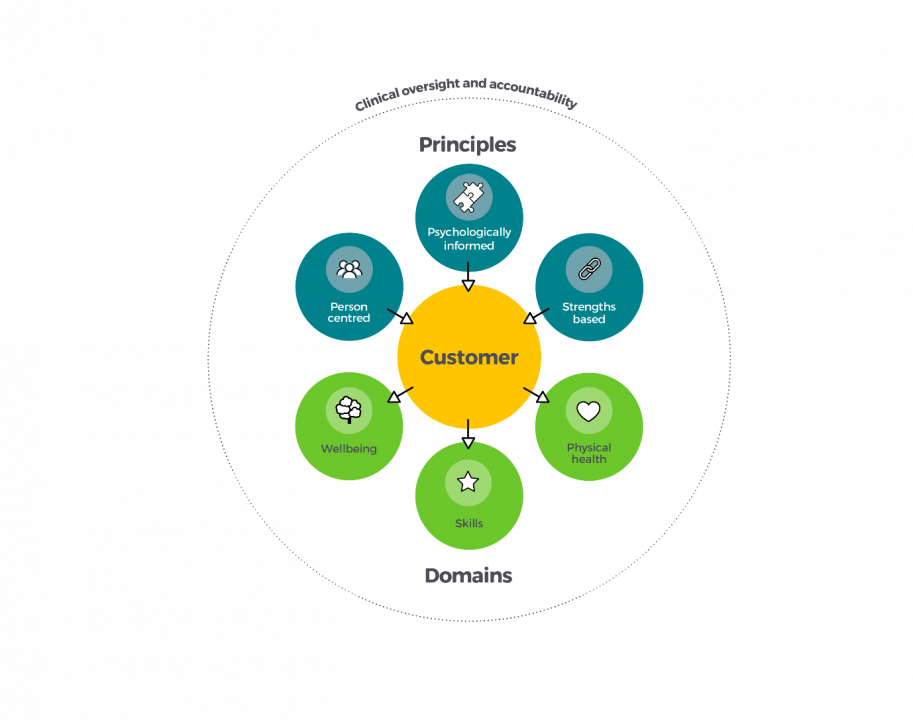Coronavirus has made people think differently about how they care for others. Jenny Mace, Strategic Lead for Service Design and Practice at Home Group, explains how her organisation has been doing this for some time now.
Covid-19 brought the importance of the NHS to the forefront of public consciousness like never before. We all wholeheartedly clapped for the heroes saving lives and placing themselves at great risk. What we didn’t see is the social care sector getting the attention it deserves.
I know the impact the sector has on people’s lives – and the impact if social care continues to be underfunded and underappreciated. As one of the largest providers of integrated housing and care in the UK, we recognised that things needed to change so looked at a new approach to empowering colleagues and improving quality of life for our customers.
We have a vision for our services; enabling people to get the right support in the right place. Strategically, we have been moving towards models that integrate health, housing and care, bringing together colleagues with clinical training to enrich the support we deliver.
Home Group also developed a new approach to enable clinical colleagues to work alongside support colleagues - all operating within the same framework of values and language that shape our way of working. We call this new framework LIFE – Living Independently, Feeling Enabled.
During LIFE’s development, we worked in partnership with customers, colleagues and external experts, including Imosphere, The Tizard Institute, the British Institute of Learning Disabilities, as well as GPs.
Life Principles
We identified three governing principles that direct how we deliver all our support and interventions; from formulating risk through to personal care - and even filling in a housing benefit form. Its processes are simple but can have a significant impact on the wellbeing of customers with low level issues right through to those with more complex needs.
LIFE focuses support on what matters to our customers, not what’s the matter with them. Being psychologically informed, the emphasis is on developing a therapeutic environment where we seek to understand customers by working creatively and constructively and encouraging an empathetic approach, with our teams spending time in clinically led reflective sessions to explore and improve practice.
Our services are person centred and tailored for each of our customers; identifying their unique talents, gifts, history and aspirations. We build on strengths and motivations, rather than focussing on what people can’t do or their challenges. One of my favourite stories is of a young man, let’s call him Sam, who struggled with washing himself regularly and had difficulties with body odour.

The team had a personal care plan in place and prompted him regularly to wash. But encouragement had become a nag and his reaction was changing from annoyance to distress, anger and significant aggression. Put simply, the man and his team were at loggerheads.
When LIFE was introduced the team reflected that Sam did not see washing as important to him, it was important to them. When he was asked what was important to him, he said: “I want to be mainstream”.
As the team helped Sam translate this into small ‘tasks’ the subject of body odour came up again. He understood that if he wanted the people, he meets to see him as ‘mainstream’ it meant smelling nice. The problem was resolved. A simple shift of camera angle towards what motivated and mattered to Sam meant the power struggle disappeared.
Life Domains
LIFE is split into three overlapping domains. Wellbeing focuses on what’s important to and for our customers. It encompasses both aspirations and management of risk, so they can extend and explore their world safely. We have introduced risk formulation overseen by psychologists and clinically qualified Mental Health Practice Leads, significantly upskilling our support colleagues.
The Positive Behaviour Support model is key to understanding customer behaviour. Our central clinical team includes a behavioural specialist who supports local clinicians and teams, providing functional behavioural assessment, training and coaching.
Our skills domain focuses on developing our customers’ skills to remain independent or gain independence. It encompasses communication, daily living and the ability to engage with local communities. Our occupational therapists oversee this domain and provide training and clinical coaching for support teams. Customers are supported to be actively involved, building their skills and living lives full of meaning.
Physical health addresses personal behaviour and lifestyle risks, access to healthcare and enabling reasonable adjustments. Covid-19 shone a very clear and poignant light on health inequalities and re-energised our ambition to address them.
We have employed physical health nurses to enable colleagues across our services to understand the impact of social determinants, such as housing, social inclusion, disability, loneliness and low self-esteem, as well as the unequal impact on BAME communities.
LIFE is part of delivering our integrated model which is most needed for those who have consistently received the worst support and not had their needs met.
Liam* had to sacrifice his freedoms, hobbies, friends and family and live in a locked service far from his home. He has a diagnosis of autism, ADHD and severe learning disabilities and was detained under Section 3 of the mental health act. Liam’s story is typical for many who are considered part of the Transforming Care Programme.
For Liam to enjoy a better quality of life he needed a home that was supported by a team who understood him and provided empathetic support. He needed minimal disturbances from peers, neighbours or even traffic. Family contact was important to him, so his home needed to accommodate regular visitors as well as his support team. Finally, having a private garden was one of the most important things to Liam.
We identified a property for Liam using the skills of our clinical and development teams, and in partnership with his family, and he successfully moved into his new Home in April 2019. Liam has adjusted well to community life and is enjoying his garden, regular visits from his family and, most importantly, the quality of life he deserves.
Early adopters of LIFE have reported wonderful lightbulb moments; from the highly complex needs of our transforming care customers right through to our registered Independent Supported Living services. By believing in our support workers and providing them with the guidance, tools and framework they need, we know that they can not only reach their full potential but also provide life-changing outcomes for all our customers.
*Names have been changed.



















